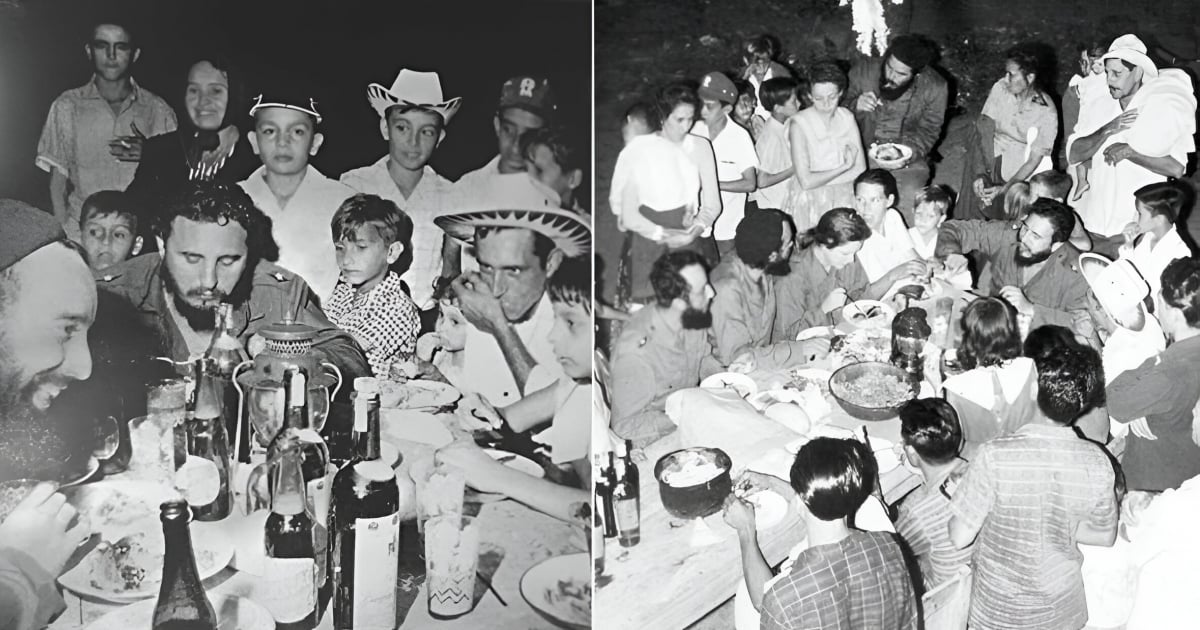The official Cuban media attempted to celebrate the holiday season but choked on the memory of Christmas Eve in 1959. Cubadebate, an official media outlet, shared a photograph on Facebook of Fidel Castro mingling with families in the Zapata Swamp, mostly charcoal workers, during Christmas 1959. They portrayed it as the "Christmas Eve of freedom," even though the end of that year, following the Agrarian Reform, left many Cubans mourning the loss of their land.
Over time, it has become evident that much of that land was never cultivated again. What once thrived under private ownership became overrun with marabou under collective management. The loss was in vain.
Cubadebate recounts that the 1959 Christmas dinner in the Zapata Swamp was attended by Fidel Castro, Celia Sánchez, and other officials like the Minister of Agriculture, Pedro Miret, and Captain Antonio Núñez Jiménez, head of the National Institute for Agrarian Reform (INRA), accompanied by their wives. Upon their arrival, the new leaders sat beneath a tree to watch a pig being roasted in the local style. One resident noted the contrast with Batista's soldiers, who the previous year had stolen their pig and killed a nephew whose burial place remains unknown.
The reactions to Cubadebate's post were swift. What the official media considered a historical reflection was perceived by netizens as a grim joke amidst the severe scarcity and darkness enveloping the island. A Facebook user, Dioelis Rivera, lamented, "Now there's no Christmas Eve at all. They're all bad, with the country plunged into blackout darkness. What was the 'revolution' for if life is worse now than before?" he questioned.
Another user, Patricia Llera, criticized the journalist, pointing out that on December 24, the province of Matanzas had awoken in darkness, with only a few areas having electricity. Her post received responses like Osmel Barnat's, noting similar conditions in Mayabeque. "What a disaster," he wrote.
Mayita Díaz criticized Cuba for being the only country where Christmas is not celebrated. "That man only brought sadness to the people," she commented, referring to Fidel Castro. Pablo Álvarez added that in 1959 there were still remnants of capitalism, but a few years after socialism took hold, hunger, widespread poverty, and the lack of individual and economic freedoms laid the foundation for today's Cuba—immersed in darkness, with over a quarter of its population fleeing socialism under the PCC's rule.
Suárez Jorge reacted more strongly, admonishing the journalist for recalling a Christmas Eve with Fidel Castro after he had ended this Catholic tradition in Cuba. "It's disrespectful for that journalist to the people, who haven't known Christmas or Christmas Eve for years. They ended all Cuban traditions."
It is challenging to find a single supportive comment for Cubadebate's festive report. Roman Hernández summarized that 1959 Christmas Eve in the Zapata Swamp as the last family dinner. "All the others were dreadful; communism arrived, and the Cuban people's happiness ended."
One of the most applauded comments came from María del Carmen Álvarez: "What a shame! So many dead for this," she said, garnering 12 likes. Similarly, Ibet Díaz de Celis Curbelo noted that on December 24, 2024, "people eat in the dark" in Cuba.
Yuneil Cepena Gijón pointed out that the table served to Fidel Castro in 1959 in the Zapata Swamp held more food than what millions of Cubans have today.
Finally, Aylén López summed up the general sentiment: "For me, this is the worst December 24. No electricity, no food, and no joy. I see no reason to celebrate," she said.
Fidel Castro abolished the Christmas holiday in December 1969, obsessed with the ten-million-ton sugar harvest that never materialized. It was reinstated in 1998 during Pope John Paul II's visit to Havana. Since then, December 25 has been a public holiday in Cuba, but the tradition of a family dinner was never restored. The extensive emigration has left many homes empty in Cuba.
Impact of the Revolution on Cuban Traditions
What was the significance of the 1959 Christmas Eve with Fidel Castro?
The 1959 Christmas Eve was portrayed by official media as the "Christmas Eve of freedom," but many Cubans were mourning the loss of their lands due to the Agrarian Reform, marking the beginning of significant social and economic changes under Castro's regime.
Why was Christmas abolished in Cuba?
Fidel Castro abolished the Christmas holiday in 1969, focusing on achieving a massive sugar harvest. It was restored in 1998 during Pope John Paul II's visit, but the family dinner tradition has not been revived due to widespread emigration and economic hardship.
How has the revolution affected Cuban families?
The revolution led to the nationalization of private lands and businesses, resulting in economic decline and the loss of traditional family gatherings. Many Cubans have emigrated, leaving homes empty and family ties strained.
